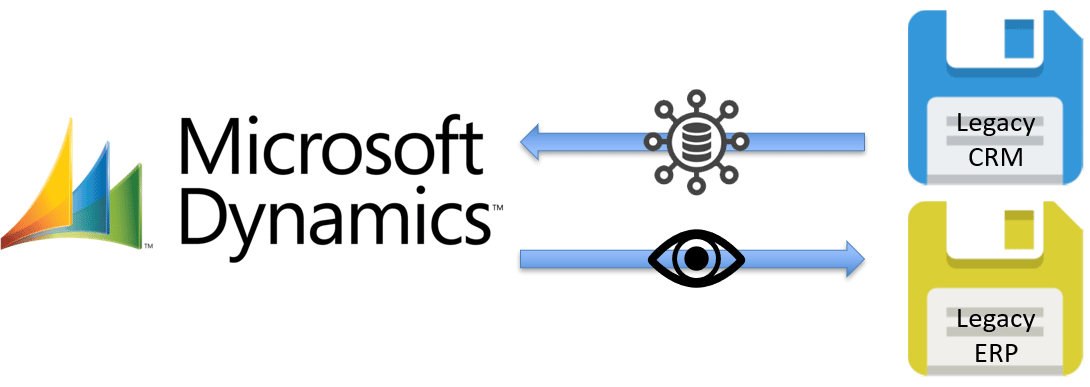Blog

Reducing Costs with Microsoft Dynamics Virtual Entities
What are Dynamics Virtual Entities?
Microsoft Dynamics Virtual Entities are here, and they allow you to experience data in a whole new way. Virtual Entities allow you to “peek” into external data from a foreign system, without having to migrate and store data in your Microsoft Dynamics environment. This data is presented similarly to your traditional Dynamics entities, which leveraging forms, fields, relationships and views. This enables you to seamlessly interact with virtual entities and Dynamics data, regardless whether you access it thru your PC, tablet or phone.
How Can Dynamics Virtual Entities Reduce Costs?
Virtual entities can help reduce costs in many ways.
- They leverage data from external data sources, you do not have to add the additional cost of Dynamics storage.
- They can be used to view archived Dynamics data, which can reduce the cost of your existing Dynamics storage.
- The data presentation is real time, so there is no cost to build or maintain a data integration.
Visibility of your key enterprise data from foreign systems can keep your team working primarily in Microsoft Dynamics. This will help reduce training and licensing costs associated with working in many disparate systems.
Here’s three Microsoft Dynamics Virtual Entities use cases we’ve implemented for our clients to help them reduce their costs.
Use Case 1 – Real Time Access To Vendor Pricing
In this scenario, I’m building a quote in Microsoft Dynamics, and need to see the latest pricing from my vendors. Since I have multiple vendors with millions of SKU’s, building multiple integration and storing stale data doesn’t make sense. With Microsoft Dynamics Virtual Entities, I can peek into my vendor’s systems, and get the latest pricing for my quote.
Use Case 2- Real Time Access To Legacy Data
In this scenario, I’m migrating multiple legacy systems to Microsoft Dynamics, including a legacy CRM and ERP system. I’ve completed my legacy CRM migration, , but I haven’t started the legacy ERP migration yet. I’m ready for my sales team to adopt Microsoft Dynamics, which is more likely to succeed when they spend more time in the product. With Microsoft Dynamics Virtual Entities, I can present legacy ERP data to my team as part of their Microsoft Dynamics experience.
Use Case 3 – Real Time Access To Archived Data
In this scenario, my team has generated a decade of completed activities in Microsoft Dynamics. Since activities can consume an average of 25% of Dynamics storage, I’d like to move them to a much cheaper storage option like Microsoft Azure Cosmos Database. I’ve made a business decision to archive any completed activity that hasn’t been touched in two years, then delete them from Microsoft Dynamics system. With Microsoft Dynamics Virtual Entities, I can now search and view these legacy activities without consuming costly Microsoft Dynamics storage.
What Are Dynamics Virtual Entities Limitations?
There are some limitations to Dynamics Virtual Entities:
- The data is read only, so you can’t create new records from Dynamics, nor can you update them.
- The security model is limited. The records are Organization owned, and not user owned. There’s also no field level security.
- Special Dynamics entity functionality is not available like auditing, queuing, offline caching, calculating or rolling fields.
One limitation listed in the Microsoft documentation is “It must be possible to model the external data as a Common Data Service entity.” This translates to “Microsoft expects the external data source to look a very specific way for Virtual Entities to work.” This isn’t always possible, especially when you and don’t have control on how the data is delivered. Not to worry, we’ve figured out how to overcome this limitation, and connect you to just about any data source including legacy API’s and SQL databases!
For more information on this topic, take a look at some of our other blogs:
https://www.beringer.net/beringerblog/managing-your-microsoft-power-platform-dataverse-storage-cost/
https://www.beringer.net/beringerblog/archiving-your-dynamics-365-data
Reach out to Beringer today!
Are you up against your storage limit in Microsoft Dynamics CRM? Do you need a way to view real time data from another system? We’ve been working with Microsoft Dynamics since its inception, and we’re always finding innovative ways to implement the latest tools and help automate business processes. If you are looking for a certified Microsoft solution partner to help you implement Microsoft Dynamics Virtual Entities, then make sure you pick the one who loves working with the technology 🙂
Beringer Technology Group, a leading Microsoft Gold Certified Partner specializing in Microsoft Dynamics 365 and CRM for Distribution. We also provide expert Managed IT Services, Backup and Disaster Recovery, Cloud Based Computing and Unified Communication Solutions.







